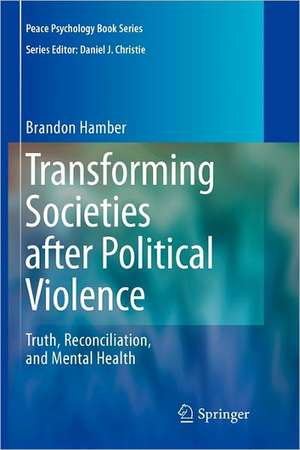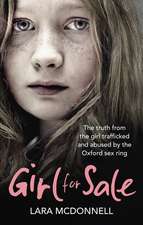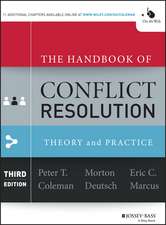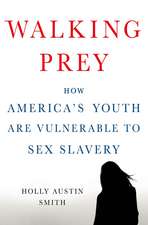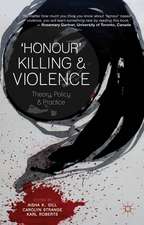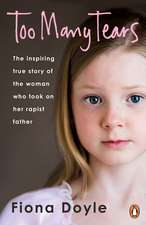Transforming Societies after Political Violence: Truth, Reconciliation, and Mental Health: Peace Psychology Book Series
Autor Brandon Hamberen Limba Engleză Paperback – 6 dec 2010
| Toate formatele și edițiile | Preț | Express |
|---|---|---|
| Paperback (1) | 779.89 lei 6-8 săpt. | |
| Springer – 6 dec 2010 | 779.89 lei 6-8 săpt. | |
| Hardback (1) | 894.79 lei 6-8 săpt. | |
| Springer – 27 mai 2009 | 894.79 lei 6-8 săpt. |
Din seria Peace Psychology Book Series
- 18%
 Preț: 779.26 lei
Preț: 779.26 lei -
 Preț: 361.07 lei
Preț: 361.07 lei - 15%
 Preț: 639.25 lei
Preț: 639.25 lei - 18%
 Preț: 788.54 lei
Preț: 788.54 lei - 15%
 Preț: 699.28 lei
Preț: 699.28 lei - 15%
 Preț: 646.62 lei
Preț: 646.62 lei - 18%
 Preț: 1690.13 lei
Preț: 1690.13 lei - 15%
 Preț: 645.28 lei
Preț: 645.28 lei - 24%
 Preț: 1044.87 lei
Preț: 1044.87 lei - 18%
 Preț: 945.14 lei
Preț: 945.14 lei - 15%
 Preț: 649.54 lei
Preț: 649.54 lei -
 Preț: 386.39 lei
Preț: 386.39 lei - 15%
 Preț: 697.82 lei
Preț: 697.82 lei - 15%
 Preț: 591.14 lei
Preț: 591.14 lei - 18%
 Preț: 1222.94 lei
Preț: 1222.94 lei - 15%
 Preț: 644.82 lei
Preț: 644.82 lei - 15%
 Preț: 649.22 lei
Preț: 649.22 lei - 15%
 Preț: 697.65 lei
Preț: 697.65 lei -
 Preț: 388.72 lei
Preț: 388.72 lei - 15%
 Preț: 647.08 lei
Preț: 647.08 lei - 24%
 Preț: 967.03 lei
Preț: 967.03 lei - 15%
 Preț: 638.89 lei
Preț: 638.89 lei - 15%
 Preț: 650.37 lei
Preț: 650.37 lei - 18%
 Preț: 733.15 lei
Preț: 733.15 lei -
 Preț: 398.74 lei
Preț: 398.74 lei - 15%
 Preț: 644.30 lei
Preț: 644.30 lei - 18%
 Preț: 1116.57 lei
Preț: 1116.57 lei -
 Preț: 365.05 lei
Preț: 365.05 lei - 15%
 Preț: 643.99 lei
Preț: 643.99 lei - 18%
 Preț: 1116.26 lei
Preț: 1116.26 lei - 18%
 Preț: 1381.26 lei
Preț: 1381.26 lei - 18%
 Preț: 1595.75 lei
Preț: 1595.75 lei
Preț: 779.89 lei
Preț vechi: 951.08 lei
-18% Nou
Puncte Express: 1170
Preț estimativ în valută:
149.24€ • 159.58$ • 124.43£
149.24€ • 159.58$ • 124.43£
Carte tipărită la comandă
Livrare economică 17 aprilie-01 mai
Preluare comenzi: 021 569.72.76
Specificații
ISBN-13: 9781441927934
ISBN-10: 144192793X
Pagini: 249
Ilustrații: VIII, 249 p. 2 illus.
Dimensiuni: 155 x 235 x 14 mm
Greutate: 0.38 kg
Ediția:Softcover reprint of hardcover 1st ed. 2009
Editura: Springer
Colecția Springer
Seria Peace Psychology Book Series
Locul publicării:New York, NY, United States
ISBN-10: 144192793X
Pagini: 249
Ilustrații: VIII, 249 p. 2 illus.
Dimensiuni: 155 x 235 x 14 mm
Greutate: 0.38 kg
Ediția:Softcover reprint of hardcover 1st ed. 2009
Editura: Springer
Colecția Springer
Seria Peace Psychology Book Series
Locul publicării:New York, NY, United States
Public țintă
ResearchCuprins
Looking Back, Moving Forward.- Miracles, Trauma and the Truth Commission.- A Tidal Wave of Emotion.- A Place for Healing.- Ambivalence and Closure.- Reparations and Paying for the Past.- Doing Justice.- Assessing Truth and Reconciliation.- Truth Telling and Violence Prevention.- Transforming Transitional Societies.
Recenzii
From the reviews:
"Hamber brings an acute clinical sensibility and sophisticated research mind to a complex problem: state handling of reconciliation after a catastrophic upheaval. … his main focus in this book is the South African Truth and Reconciliation Commission (TRC) process. … a must read for any psychologist working with trauma survivors, especially postconflict trauma survivors. It calls upon a rich literature–from psychoanalysis … to trial transcripts of commissions; it integrates all these sources to provide a truly unique contribution to the psychology of trauma." (Don Dutton, PsycCRITIQUES, Vol. 54 (47/3), November, 2009)
"Hamber brings an acute clinical sensibility and sophisticated research mind to a complex problem: state handling of reconciliation after a catastrophic upheaval. … his main focus in this book is the South African Truth and Reconciliation Commission (TRC) process. … a must read for any psychologist working with trauma survivors, especially postconflict trauma survivors. It calls upon a rich literature–from psychoanalysis … to trial transcripts of commissions; it integrates all these sources to provide a truly unique contribution to the psychology of trauma." (Don Dutton, PsycCRITIQUES, Vol. 54 (47/3), November, 2009)
Notă biografică
Brandon Hamber, Ph.D. was born in South Africa and currently works in Belfast, Northern Ireland. He was trained as a clinical psychologist in South Africa and holds a Ph.D. from the University of Ulster. He is the Director of INCORE (International Conflict Research Institute), an associate site of the United Nations University based at the University of Ulster. He coordinated the Transition and Reconciliation Unit at the Centre for the Study of Violence and Reconciliation. He works mainly in the area of violence and trauma, and coordinated the Centre's project focusing on the Truth and Reconciliation Commission.
Textul de pe ultima copertă
It is a momentous day for a nation when war is over or a brutal regime ends. For victims and survivors of political atrocities, it is also a time to process trauma, to anticipate the future, to be heard—and to be healed.
Transforming Societies after Political Violence offers a template for those tasked with providing truth, justice, reconciliation, and healing. This interdisciplinary study identifies complex relationships between recovery from political violence and the psychological processes that accompany widespread social change, showing how these can be integrated to strengthen both individual and society. Author Brandon Hamber draws on his extensive experience in South Africa and comparative examples from elsewhere to examine the centrality of mental health issues in transitional justice, and the social, cultural, and identity issues involved in meeting the needs of victims. In discussing reparations (what the author terms "repairing the irreparable"), the power of ambivalence, and especially concepts of closure, he eloquently sets out professionals’ roles in helping survivors move beyond the toxic past without covering it up or becoming mired in it.
Among the critical areas covered:
Transforming Societies after Political Violence offers a template for those tasked with providing truth, justice, reconciliation, and healing. This interdisciplinary study identifies complex relationships between recovery from political violence and the psychological processes that accompany widespread social change, showing how these can be integrated to strengthen both individual and society. Author Brandon Hamber draws on his extensive experience in South Africa and comparative examples from elsewhere to examine the centrality of mental health issues in transitional justice, and the social, cultural, and identity issues involved in meeting the needs of victims. In discussing reparations (what the author terms "repairing the irreparable"), the power of ambivalence, and especially concepts of closure, he eloquently sets out professionals’ roles in helping survivors move beyond the toxic past without covering it up or becoming mired in it.
Among the critical areas covered:
- The vital groundwork that must be made before reconciliation can occur.
- Creating context-driven approaches to political and social trauma.
- Assessing truth, documenting the past, and avoiding re-traumatization.
- The role of mental health professionals in truth commission processes.
- Survivors as agents for justice, from civic participation to giving public witness.
- Reparations—symbolic meaning, national value, personal benefits.
- Promoting reconciliation and preventing further violence.
Caracteristici
Examines the relationship and interplay between transitional justice, peace psychology, and trauma Looks at how political processes and individual trauma have intersected to become a subject of increasing relevance in the field of psychosocial studies Emphasizes into the necessity of meeting the needs of victims of violence and the process of giving public witness to individual hardship
